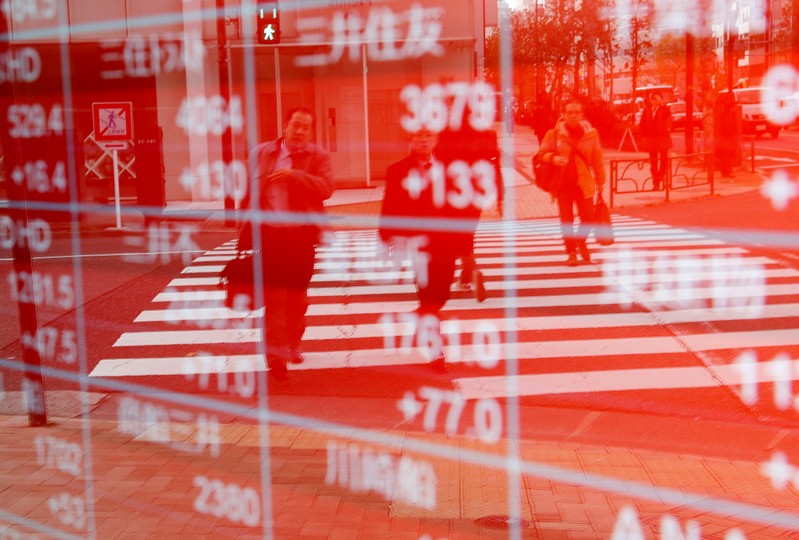
FILE PHOTO: Pedestrians are reflected on an electronic board showing stock prices outside a brokerage in Tokyo, Japan December 27, 2018. REUTERS/Kim Kyung-Hoon
April 12, 2019
By Herbert Lash
NEW YORK (Reuters) – Global stocks rose on Friday after JP Morgan’s results kicked off the U.S. corporate earnings season in style, while signs of stabilization in China’s economy helped riskier assets amid talk that the growth outlook worldwide is better than thought.
Chinese data showed exports rebounded in March, lifting U.S. and euro zone bond yields to three-week highs and helping offset weaker imports and reports of another cut to German growth forecasts.
Investors are looking for signs of a Chinese economic recovery to temper global growth worries, especially after the International Monetary Fund this week downgraded its 2019 world economic outlook for the third time.
China’s trade results, as well as credit data, have helped boost risk appetite and reinforce the stabilization thesis, which should have spill-over effects for the global economy, said Candice Bangsund, a portfolio manager with the global asset allocation team at Fiera Capital in Montreal.
“The whole China situation really appears to be gaining some ground,” Bangsund said. “We saw a very impressive rebound in exports; this of course is helping alleviate fears of a hard landing.”
U.S. stocks rallied on JPMorgan and an 11.5% jump in Walt Disney Co shares, which lifted the Dow Industrials by 1% and helped the S&P 500 total return index post a record close.
MSCI’s gauge of equity market performance in 47 countries gained 0.46%, while the EURO STOXX 50 index rose 0.36%.
JPMorgan’s quarterly earnings easily beat analyst estimates, easing fears that slowing economic growth could weigh on results. JPMorgan’s shares rose 4.69% and led a broad rally in bank stocks, with the KBW banking index gaining 1.94%.
Regional lenders in Europe, including StanChart, Deutsche Bank, BNP Paribas and Credit Suisse, also rallied on JPM’s results, taking the European bank index up 1.9 percent to a five-month high.
On Wall Street, the Dow Jones Industrial Average rose 269.25 points, or 1.03%, to 26,412.3. The S&P 500 gained 19.09 points, or 0.66%, to 2,907.41, and the Nasdaq Composite added 36.81 points, or 0.46%, to 7,984.16.
The euro gained despite the German growth concerns. Dealers were gearing up for demand from Japan as Mitsubishi UFJ Financial closed in on its multi-billion-euro acquisition of DZ Bank’s aviation-finance business. [EUR/FRX]
The dollar index fell 0.21%, with the euro up 0.38% to $1.1293. The Japanese yen weakened 0.30% versus the greenback at 112.02 per dollar.
Euro zone and U.S. government debt yields rose after the rebound in Chinese exports. Yields on Germany’s 10-year government bond crossed into positive territory, to 0.058%.
Benchmark 10-year U.S. Treasury notes fell 16/32 in price to push up their yield to 2.5615%.
CRUDE OIL’S BIG 2019 START
Oil provided big milestones, with Brent breaking through the $70 threshold this week and the U.S. benchmark posting six straight weeks of gains for the first time since early 2016. [O/R]
Involuntary supply cuts in Venezuela, Libya and Iran have supported perceptions of a tightening market, already constrained by production cuts from the Organization of the Petroleum Exporting Countries and its allies.
Brent crude oil futures settled up 72 cents at $71.55 a barrel, while West Texas Intermediate crude futures, the U.S. benchmark, rose 31 cents to settle at $63.89.
Commodities have had the best first-quarter start ever, Bank of America Merrill Lynch analysts said, calling the annualized returns they are tracking the strongest in the past 100 years.
Taking advantage of strong prices and subdued valuations for oil producers, Chevron said it will buy Anadarko Petroleum Corp for $33 billion in cash and stock.
Gold steadied after posting its biggest daily decline in two weeks on Thursday when it broke below the key psychological level of $1,300 an ounce, as the impact of a weak dollar was offset by gains on Wall Street.
U.S. gold futures settled 0.1% higher at $1,295.2.
For a graphic on Falling volatility, see – https://tmsnrt.rs/2X40O8U
(Reporting by Herbert Lash; Editing by Cynthia Osterman and Leslie Adler)

